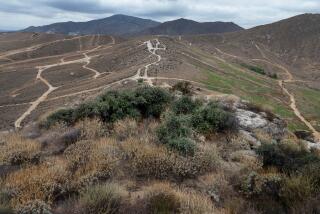Council OKs 4,200-Acre Development : Construction: The low-density project includes affordable homes, golf courses. It could create 2,000 jobs.
In a move that may create more than 2,000 construction-related jobs here, the San Diego City Council has approved a plan to build more than 1,000 executive-style homes in a slice of pastoral north San Diego.
Voting unanimously Tuesday to approve the 4,200-acre Black Mountain Ranch project, the City Council paved the way for the first of a two-phase development planned by Potomac Investment Associates.
The project, which lies in the city’s northern urban reserve where all but low-density development must be approved by voters, meets land-use restrictions of one home per 4 acres.
Potomac’s site is west of Interstate 15, bounded by Rancho Bernardo and Carmel Mountain Ranch on the east, Rancho Santa Fe and Fairbanks Ranch on the west and Rancho Penasquitos on the south.
The developer’s agreement with the city calls for construction of 1,217 executive homes and 195 units of low-income housing, meaning they would be priced to be affordable for families with a median income of $25,000. Construction is expected to begin in 1995.
The developer plans to begin construction of two golf courses, totaling about 550 acres and equipped to accommodate PGA golf tournaments, sometime late next year. The courses are expected to be completed in time to host the 1995 Buick Invitational golf tournament, according to Stephen Coury, Potomac’s public affairs consultant.
“Driving this development program was the relationship the developer has with the PGA tour,” Coury said.
Phase two of Black Mountain Ranch is 502 acres and would include between 1,200 and 2,000 homes, 50,000 square feet of commercial space and a resort hotel. Because that development does not meet the urban reserve’s land-use restrictions, it cannot move forward until 1994.
That’s when voters will decide a ballot measure asking whether the city should allow higher-density development in the urban reserve--a 12,000-acre “future urbanizing area” that now consists of mostly undeveloped and privately owned land.
At the request of the city, Potomac hired a consultant--Economic Research Associates--to prepare a report estimating the number of jobs Black Mountain Ranch may create. The report states that construction activity would support about 2,050 jobs per year during the 13-year construction period of both phases. That includes 600 direct construction jobs and 1,450 spinoff jobs.
The firm estimated that an additional 1,600 permanent jobs may be generated by the project’s commercial operations.
Potomac bought the Black Mountain Ranch site during a bankruptcy sale in 1988 and, guided by public workshops in nearby communities, has been planning the development ever since. Overall, the project received little opposition from environmentalists or neighboring communities, mostly because it meets current land-use restrictions and includes 1,758 acres of public open space.
“I’m reluctant about opening this area (to development), but if it has to happen this is a good project--it’s low density and it gives us many amenities,” said Councilwoman Abbe Wolfsheimer, whose district includes the Black Mountain Ranch site.
Representatives from neighboring communities--Rancho Bernardo, Carmel Valley and Fairbanks Ranch--spoke in favor of the project at Tuesday’s council meeting.
“I think the effort that the Potomac people made to work with the community to answer questions was outstanding, and I would like to see that be a standard throughout San Diego. Then maybe we wouldn’t see the image problems some developers now have,” Councilwoman Valerie Stallings said.
Also, she said, “the open space is a major boon--one of the city’s big concerns is how we’re going to acquire the space to have the wildlife corridors we want.”
More to Read
Sign up for Essential California
The most important California stories and recommendations in your inbox every morning.
You may occasionally receive promotional content from the Los Angeles Times.










